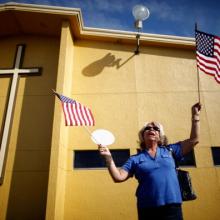evangelical vote
On Friday, President Donald Trump prepared to be the first U.S. president to attend the March for Life, the annual gathering of anti-abortion activists and faith groups in Washington, D.C., just after Vice President Mike Pence met with Pope Francis during an unusually long audience at the Vatican.
“I want to know, who are the 19 percent?” Trump quipped, referring to those evangelicals who didn’t vote for him. “Where did they come from?
True, Trump has finally rallied the crucial white evangelical Christian base of the GOP to his side. But he still has outspoken detractors among prominent Christian conservatives and he is viewed with ambivalence and even deep suspicion by many Jewish and Muslim voters and members of other minority faiths.
Donald Trump’s flagging presidential bid is enjoying a boost of that old-time religion after conservative Christian leaders gave the candidate high praise and standing ovations at a critical closed-door meeting that one observer described as a “campaign rally.”

Empty podiums at the Republican debate on Dec. 15 in Las Vegas. Joseph Sohm / Shutterstock.com
I can’t watch the political debates for long without feeling sick: So much animosity and ego and bullying and attacking and negativity; so little thoughtful discussion and kindness. The toxic words seep inside my skin and into my emotions. I have to get away from it.
The worst part is when candidates use their “religion” as a justification for all of the ugliness being spewed — when they start trying to one-up the other and convince voters that they, themselves, are true believers who rank right up there on Jesus’ most-favored list.

Repbulican candidates at the Las Vegas debate on Dec. 15. Joseph Sohm / Shutterstock.com
When the media says “evangelicals” they really mean “white evangelicals” and virtually never measure the opinions and voting practices of black, brown, or even young evangelicals. In fact, they don’t even ask religious identity questions of Democratic primary voters where many of the black, brown, and young evangelicals may be voting. It is older white evangelicals who are mostly voting in the Republican primaries and now are increasingly supporting Donald Trump. “What?” is indeed the right question.

Senator Ted Cruz is a guest during a morning service at Christian Life Assembly of God in Des Moines, Iowa on Nov. 29. Photo by Clay Masters, iprimages/Flickr.com
Ted Cruz ended Monday night with a yuuuuge victory over Donald Trump in Iowa. (Sorry, had to do it!) Religion played a big role in Cruz’s victory. The New York Times reports that Cruz’s victory was “powered by a surge of support from evangelical Christians.”
For his part, Cruz reaffirmed his connection with his evangelical supporters by evoking divine favor upon his victory. “God bless the great state of Iowa! Let me first say, to God be the glory.”
But I can’t help but feel uneasy about the God proclaimed by the so-called "evangelical vote." That’s because, when it comes to their evangelical faith, they have an identity crisis.
The road to the White House is no longer white and Christian.
President Obama won last week with a voter coalition that was far more racially and religiously diverse than Mitt Romney’s – a phenomenon both predicted in the days before the election and confirmed in the days after.
What the Public Religion Research Institute has concluded since, however, has farther-reaching implications: that relying on white Christian voters will never again spell national electoral success — especially for the GOP.
“The changing religious landscape is presenting a real challenge to the strategy that relied on motivated white Christians, particularly white evangelical Christians,” said PRRI Research Director Dan Cox, referring to a PRRI study released Thursday.
In Tuesday’s Mississippi and Alabama primaries, about eight of 10 voters identified as evangelical, locking in victories for former Sen. Rick Santorum, and proving once again the importance of the evangelicals in the election.
Presidential hopefuls are again battling it out to be the God candidate, but the tide of the so-called “evangelical vote” seems ever-shifting. Santorum—a Catholic—is doing better to court most evangelicals, while former Massachusetts governor Mitt Romney — a Mormon — is beating out Santorum among Catholics. And according to a recent poll, Republicans in the Deep South are still questioning whether President Barack Obama is a Muslim.
Religion matters.
But what does the “evangelical vote” even mean anymore? And can any one candidate really claim it? Even with Santorum’s win Tuesday, a significant number still fell into Romney’s column — and that’s just among Republican evangelicals. Obama was able to draw some evangelical support in 2008 and could garner more in November.
New analysis by the Pew Forum on Religion & Public Life, based on National Election Pool exit polling conducted during the Super Tuesday GOP primaries, shows that Mitt Romney continues to struggle among the GOP’s white born-again/evangelical voters. He did win the evangelical vote in two of the seven states where exit polling was conducted: Massachusetts (where he served as governor); and Virginia (where neither Santorum nor Gingrich were on the ballot). In four states, Romney received significantly less support from evangelicals than from non-evangelical voters — continuing the pattern seen in previous caucuses and primaries.






